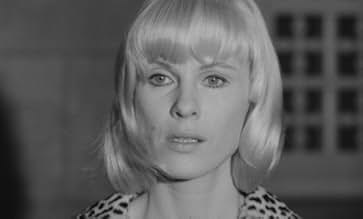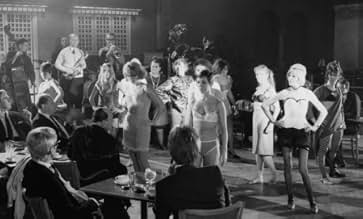AVALIAÇÃO DA IMDb
6,7/10
1,1 mil
SUA AVALIAÇÃO
Adicionar um enredo no seu idiomaThree Swedish stage actresses give differing interpretations of the classic Aristophanes play "Lysistrata."Three Swedish stage actresses give differing interpretations of the classic Aristophanes play "Lysistrata."Three Swedish stage actresses give differing interpretations of the classic Aristophanes play "Lysistrata."
- Direção
- Roteiristas
- Artistas
Margreth Weivers
- Tourist Manager's Wife
- (as Margaret Weivers)
Signe Enwall
- Choir Member
- (as Signe Envall)
- Direção
- Roteiristas
- Elenco e equipe completos
- Produção, bilheteria e muito mais no IMDbPro
Avaliações em destaque
I was prompted to write a little bit about this film because i think the other review on this page is absolutely ridiculous. And, as this is a rather obscure film, i didn't want that to be the only word on this great film.
I just want to say that from the way this film tells it's story right on through the way it is performed and on to what it ultimately says not only HOLDS UP through time, it is most definitely relevant in today's gender climate. I was absolutely blown away by the ballsy film-making and the fearless way in which it presents its ideas. Very much ahead of it's time.
Everyone should see this film, especially men. and of all men, especially men who think and write like the other reviewer on this page. SEE THIS MOVIE!
I just want to say that from the way this film tells it's story right on through the way it is performed and on to what it ultimately says not only HOLDS UP through time, it is most definitely relevant in today's gender climate. I was absolutely blown away by the ballsy film-making and the fearless way in which it presents its ideas. Very much ahead of it's time.
Everyone should see this film, especially men. and of all men, especially men who think and write like the other reviewer on this page. SEE THIS MOVIE!
I've just seen this film today, 19 Sept., and couldn't help but think of the New York terrorist attack. I read a letter to the editor about the attack and it said that if women were ruling the world the attacks would never have happened. However, this prescient film shows that that ain't necessarily so.
What's so good about this film is the fair treatment it gives of women, showing their frivolous and silly side as well as the struggle to deal with their roles in their world. I liked the fight between the women, and the pathetic attempt Liz made to stir her audience into speaking, without any thought for who it was she addressed.
Thirty-three years after it was made, the film is relevant and moving.
What's so good about this film is the fair treatment it gives of women, showing their frivolous and silly side as well as the struggle to deal with their roles in their world. I liked the fight between the women, and the pathetic attempt Liz made to stir her audience into speaking, without any thought for who it was she addressed.
Thirty-three years after it was made, the film is relevant and moving.
Harriet Andersson, Bibi Andersson, and Gunnel Lindblom go on tour with LYSISTRATA and become radicalized into political agency by the play and the reactions -- or lack of reactions -- to it.
Mai Zetterling's film disappeared from the theaters after three weeks of awful receipts. The critics -- men, of course -- didn't care for this tale of how these women's real lives bonded with their stage lives to create a third life, part dream, part hallucination, with the men reduced to indistinguishable, impotent actors driven simply by their lusts for sex and dull normality.
The movie has gained respect over the years, with feminists acclaiming it. But were the critics of the time so wrong? Aristophanes' play has often often attracted the attention of modern writers and producers. They've made modern-dress novels, and plays and movies, and they seem to have a uniformly poor reception. Perhaps the attraction of the source material to Ms Zetterling was it was one of the few works of classic literature in which women had agency. Whereas Aristophanes intended this as mockery of the new, more democratic spirit of Athens that he so despised, offering peace as so obvious that even women could see it, and men being such brutes that they'd do anything for sexual release. He was not making an argument for extending the franchise to women; he wanted a return to the Good Old Days, when aristocrats with names like Aristophanes were in charge.
Perhaps the failing here is Ms Zetterling's honesty. Like Spike Jones, in his gloss on the play, CHI-RAQ, she points out the hypocrisy of the class she argues for, their cowardice in refusing to accept responsibility. That's one of the risks of satire. Once you've offended everyone, there aren't going to be many fans.
Mai Zetterling's film disappeared from the theaters after three weeks of awful receipts. The critics -- men, of course -- didn't care for this tale of how these women's real lives bonded with their stage lives to create a third life, part dream, part hallucination, with the men reduced to indistinguishable, impotent actors driven simply by their lusts for sex and dull normality.
The movie has gained respect over the years, with feminists acclaiming it. But were the critics of the time so wrong? Aristophanes' play has often often attracted the attention of modern writers and producers. They've made modern-dress novels, and plays and movies, and they seem to have a uniformly poor reception. Perhaps the attraction of the source material to Ms Zetterling was it was one of the few works of classic literature in which women had agency. Whereas Aristophanes intended this as mockery of the new, more democratic spirit of Athens that he so despised, offering peace as so obvious that even women could see it, and men being such brutes that they'd do anything for sexual release. He was not making an argument for extending the franchise to women; he wanted a return to the Good Old Days, when aristocrats with names like Aristophanes were in charge.
Perhaps the failing here is Ms Zetterling's honesty. Like Spike Jones, in his gloss on the play, CHI-RAQ, she points out the hypocrisy of the class she argues for, their cowardice in refusing to accept responsibility. That's one of the risks of satire. Once you've offended everyone, there aren't going to be many fans.
I had high hopes for this, featuring a trio of Bergman's greatest actresses (Bibi Andersson, Harriet Andersson, Gunnel Lindblom) in the leads and a pair of his greatest actors (Gunnar Bjornstrand, Erland Josephson) in supporting roles. Unfortunately, Mai Zetterling (whose LOVING COUPLES I somewhat enjoyed) goes way over-the-top with the experimental flourishes. The story involves a production of Aristophanes' classic sex satire "Lysistrata", with the play, reality, and fantasy bleeding into each other in a series of obvious juxtapositions, half-baked metaphors and heavy-handed social commentary. Subtlety is not to be found here, and the film's divebomb approach to the battle of the sexes is often grating and tedious. These actors are usually a joy to watch, and they give it their all, but they just can't overcome the material, which comes off as another naive product of 60's progressiveness. The heart's in the right place, but the execution is too irritating. Nice photography and a strong cast aren't enough.
This has become my favourite Swedish film. I've seen i t many times. At first I thought it would be gloomy and depressing in a Bergman way. It wasn't. It's a funny, spirited and inventive film.
It's nice to see that even swedes were caught up in the sixties and felt the charge of new ways of thinking and being. New ideas about social behavior, youth and womens place in society were taken up in "the Girls". It's refreshingly shown and not preachy. There's a lot of humour in it and the men get to say their opinions about women too so it's not one-sided.
Some reviewers here have commented on it as being dated. It is a product of it's time but some of the subjects it takes up are timeless. How much should a woman have to compromise with the male point of view? I think this is still a touchy subject. The film was controversial when it was released. It's not a traditional movie with a straight plot so some people might find it too unconventional. But, there are three great performances by some of the best Swedish actresses ever: Bibi Andersson, Harriet Andersson and Gunnel Lindblom who are all so delightfully energetic, lively and beautiful. They show different sides being a woman.
The film is very much a 1968 film but it's worth seeing for the great black and white photography, to see Sweden in the sixties, for the actors and for the imaginative direction by Mai Zetterling. I love it!
It's nice to see that even swedes were caught up in the sixties and felt the charge of new ways of thinking and being. New ideas about social behavior, youth and womens place in society were taken up in "the Girls". It's refreshingly shown and not preachy. There's a lot of humour in it and the men get to say their opinions about women too so it's not one-sided.
Some reviewers here have commented on it as being dated. It is a product of it's time but some of the subjects it takes up are timeless. How much should a woman have to compromise with the male point of view? I think this is still a touchy subject. The film was controversial when it was released. It's not a traditional movie with a straight plot so some people might find it too unconventional. But, there are three great performances by some of the best Swedish actresses ever: Bibi Andersson, Harriet Andersson and Gunnel Lindblom who are all so delightfully energetic, lively and beautiful. They show different sides being a woman.
The film is very much a 1968 film but it's worth seeing for the great black and white photography, to see Sweden in the sixties, for the actors and for the imaginative direction by Mai Zetterling. I love it!
Você sabia?
- CuriosidadesUnderwent a digital restoration from the original 35mm negative in 2016 by the Swedish Film Institute.
- Citações
TV Reporter: Could you tell us more precisely what it's about?
Gunilla: Well, it's rather hard to explain. It's about how things stand... now.
Liz Lindstrand: To be a bit more precise, it's about... women and war.
Marianne: I thought it was about girls and boys.
- ConexõesFeatured in Stjärnbilder (1996)
Principais escolhas
Faça login para avaliar e ver a lista de recomendações personalizadas
- How long is The Girls?Fornecido pela Alexa
Detalhes
- Tempo de duração1 hora 40 minutos
- Cor
- Mixagem de som
- Proporção
- 1.66 : 1
Contribua para esta página
Sugerir uma alteração ou adicionar conteúdo ausente


































